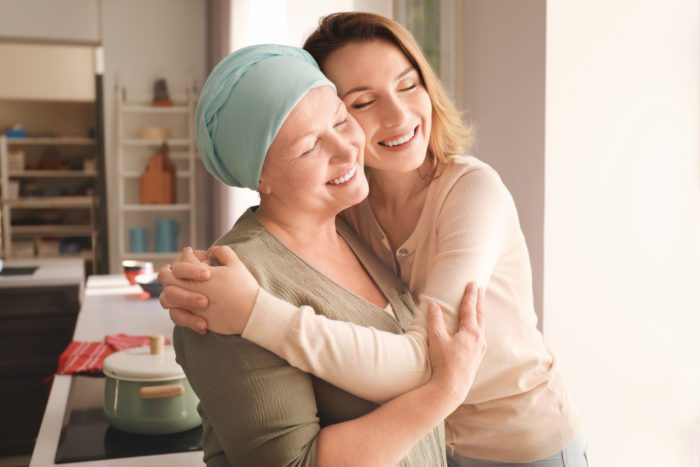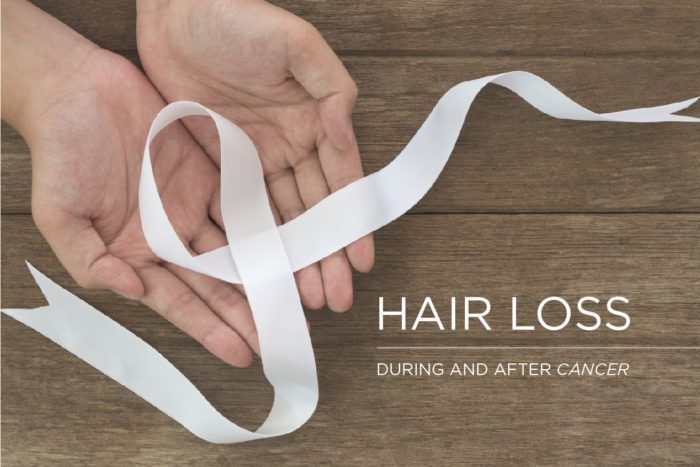Every year during the month of June we celebrate the +17 million Americans who have survived their battle with cancer. If you, or a loved one, are currently undergoing treatment, it’s important to remember that life itself is a milestone to celebrate. No matter where you/they are in the process, you/they are still here. Alive. And definitely not alone, ever. As a way to honor the hardships that people with this illness have had to overcome, we at Hairatin have created a special piece of palliative care for those dealing with the common struggle of losing hair with cancer.
Hair loss and cancer:
Does chemo cause hair loss? Does radiation cause hair loss?
Along with several other common side effects of cancer treatment, hair loss –medically referred to as Alopecia– can occur in the majority of patients during and after treatment. When your body goes through an invasive treatment such as chemotherapy, targeted therapy, radiation therapy, or bone marrow transplant, “bad” cancer cells are killed by the drugs involved in the treatment. Along with these bad cells, other good cells may be affected as well. Some of these affected cells are located in your hair follicles, which help your hair grow.
Without a doubt, losing hair with cancer represents much more than just a physical challenge. There is a great emotional toll that comes along with it, so it’s essential to stay informed and up to date with your physician. We advice you to ask as many questions as you need before undergoing any treatment. Some questions we recommend asking are: Will any medicines involved in my treatment lead to hair loss? If so, when will I experience it? Will it be gradual or all of a sudden?
How long does it take hair to grow back after chemo? Usually, hair begins to grow back 1 to 3 months after treatment ceases, and may take up to a year to grow to its original length. And sometimes, it will regrow with differences in its thickness, color and texture. Do you lose your eyebrows with chemo? Yes, it’s possible to lose hair all throughout your body during treatment, including your eyebrows and your eyelashes.
See: Eyelashes for Cancer Patients
Coping with hair loss during cancer.
Preventing hair loss during chemo is something that many cancer patients look forward to, but in reality there’s not enough studies to support it. Some people experience chemo without hair loss, but the vast majority do experience a significant loss. Fortunately, there are steps you can take to help cope with losing hair with cancer while your hair follicles recover to a stable growing rhythm. Some cancer hair loss solutions are:
- Cutting your hair shorter before undergoing treatment. Changing your look prior to the treatment will help you get used to the new look and feel once your hair starts falling out.
- Using hair covers –like wigs or scarves– or a hair enhancer, like Hair Building Fibers. Depending on the treatment, your hair loss might be partial or total. Either way, in most cases there is still hair vellus left in your scalp where hair fibers can adhere to. The upside of this solution is that you will be working with your own natural hair follicles. Fibers make even the thinnest of strands to appear fuller and thicker.
- Incorporating a gentle scalp care during chemo. Because your scalp will become sensitive during treatment, you will want to stay away from colorings, heat or exfoliating treatments some time before your treatment. Look for baby shampoos with natural ingredients that will not over-dry or stress your scalp. NO salt, menthol or camphor.
- Considering cold cap therapy. During your treatment, a closely fitted cool cap can be placed on your head to slow blood flow to your scalp. The cold makes it less likely for the chemotherapy drugs to reach your head. For the majority of people, this method has turned out to be successful. Still, it’s important to consult with your physician beforehand and make sure it will not compromise your particular treatment.
- Building a community. It’s helpful to hear advice from your family, your friends, or even from us. But nothing will help you as much as opening up to others who, like yourself, are living or have lived the process in their own skin. Sharing your experience with others, and hearing out their similar stories, is the most powerful and mindful step towards your healing process. It may be hard at first, but you will discover that someone out there is having the exact same feelings as you. And that will bring you peace.

Does hair grow back after chemo and/or radiation?
The short answer is yes, it’s a process. It’s OK to feel worried about your hair growth after chemo or radiation. But, just like the treatment itself, the side effects will eventually subside. Some people even get their whole head full of hair while still undergoing treatment. For others, it might take a little longer.
Whether you have a fast or slow hair growth after chemo, or any other treatment, remember that hair itself is something that changes over time. Solutions for hair thinning after chemo will always be available for you to choose from. Your hair follicles are still alive, and will most likely recover at their own pace, with patience and kindness. Most importantly, you are still alive. So celebrate that, because you get to live… and love. And that’s what life is all about.

